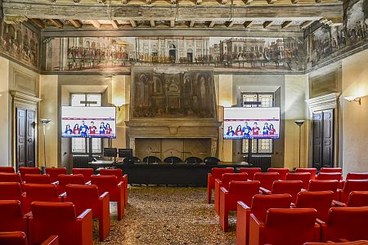What’s ancient about ancient philosophy?
"Nothing is antiquated”. “Everything is antiquated”. “Something is antiquated".

-
Date: 16 APRIL 2024 from 17:30 to 19:00
-
Event location: Sala Rossa, Palazzo Marchesini, Via Marsala, 26 - Bologna - In presence and online event
-
Type: Lectures
A distinction is traditionally drawn between philosophy itself and its history, as two different academic disciplines. Such distinction is value-laden, both in research and teaching, where higher value is placed on doing philosophy rather than its history. The generic assumption behind this common view is that the history of philosophy is ‘antiquated’, like the history of medicine or astronomy is antiquated in relation to the current disciplines; and thus, no longer useful to us. In this lecture, I want to raise and address the question of what conception of the difference between philosophy and its history underpins this common view. My special focus will be on what’s (supposedly) ancient and therefore antiquated about ancient philosophy (which is my own area of expertise). I will show that the answer is far than obvious and there is no consensus about it. I identify three main answers (with supporting philosophical arguments for each): i) nothing is antiquated (I call this the Always-all-actual response, represented e.g. by the American philosopher Michael Della Rocca); ii) everything is antiquate (I call this the isolationist response, represented e.g. by the British philosopher Bernard Williams); iii) something is antiquate (I call this the the Interactive response). I will argue that the third approach is most fruitful, and distinguish different ways to implement it, giving reasons in support to the one that I have adopted myself.
DO YOU WANT TO ATTEND THIS lecture?
-
Sala Rossa, Palazzo Marchesini, Via Marsala, 26 - Bologna
If you prefer to attend this lecture in presence, you should write to segreteria.isa@unibo.it within April 16, 12 p.m. and book your place. The places will be assigned on “first come first served” basis.
Please note that the building is not equipped so as to facilitate access for wheelchair users or people with mobility issues.
PhD students and researchers who are interested may request an attendance certificate by writing to segreteria.isa@unibo.it specifying their birthplace and date of birth.
The delivery of the attendance certificate requires the attendance of at least 70% of the lecture.
